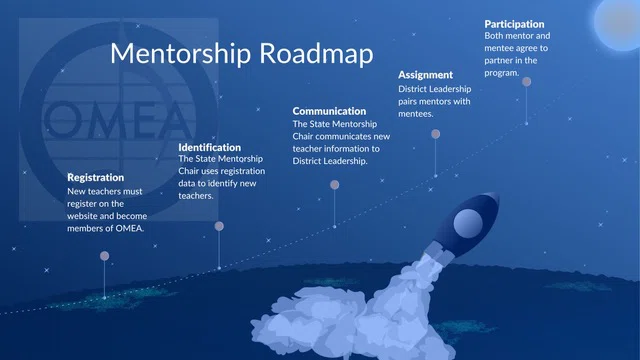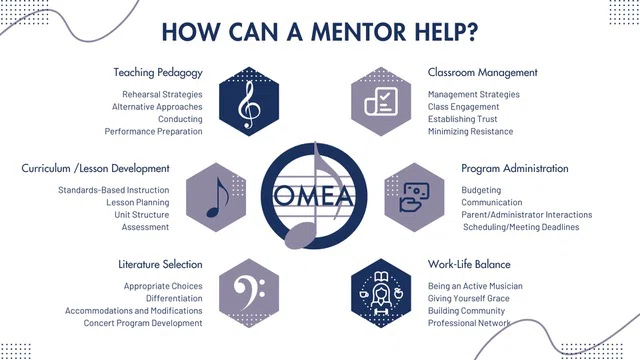©2023 Ohio Music Education Association



FEATURED ARTICLE
Do NOT Go It Alone - OMEA Mentorship
Do NOT Go It Alone - OMEA Mentorship

Do you remember your first year of teaching? If yours was like mine, it’s hard to forget. It was the most challenging, difficult, gut-wrenching, soul-searching, wonderful year of my life. I left Ohio State in the Spring of 1988 ready to conquer the world of high school band, and discovered instead that being a band director was hard. Really hard. Surprisingly, kids didn’t have the skills that I thought they would have and most of them had no interest in doing what I asked them to do. On top of that, the administration of a band program felt like a full time job on its own even without all that “teaching music” stuff. Sound familiar?

One powerful solution is mentorship. This is already happening all over the state, but is far from complete in its reach. I was one of the lucky ones who found mentorship (quite by chance) as a new teacher. I was invited by Dr. Paul Droste to join the Brass Band of Columbus. This was and remains a great honor, but one of the unintended benefits that I received was to go to band rehearsal every week with Les Susi, Gary Tirey, Phil Horch, Gary Bailes, Dan King, Dave Eaton and the list goes on. Getting to “talk band” with these master teachers was crucial in those first few years. You may have a similar story. You may not have been that fortunate.
Over the past year, OMEA has worked to reinvigorate its mentorship program. Guidelines and resources are now available on the OMEA website at https://omea-ohio.org/mentorship.php. The OMEA Mentorship Program is designed to provide support, encouragement, advice and assistance to new OMEA member teachers in Ohio. Interactions between mentor and mentee are considered private.
The OMEA Mentorship Program is NOT an evaluative mentor program, but is designed to enhance, not supplant the established local/district/state mentoring programs. OMEA mentors will be matched to their mentees based on their specific discipline (band, choral, strings, general).
How it Works
How it Works
The first step for a new teacher is to become a member of OMEA and register on the OMEA website. It is important to remember that OMEA is an association that is built to serve its membership. OMEA believes that all students should have equal access to high quality music instruction delivered by licensed music teachers through comprehensive school programs in general, instrumental and choral music education. The mentorship program is one of the many ways that OMEA is able to serve its membership to reach this goal. The bottom line is….if you don’t register, we can’t find you!
Once a new teacher has registered on the website, OMEA’s State Mentorship Chair will be able to identify them as a new teacher and will share their information with their District leadership. That teacher will then be contacted by District leadership and they will work with that teacher to identify an appropriate mentor nearby. All of this, of course, is voluntary.
The final step is the most crucial….participation. Both mentor and mentee agree to work together to improve the challenges that have been identified as priorities by the mentee. A new teacher inventory form is available to aid in this process.
How Can A Mentor Help?
How Can A Mentor Help?
Teaching music….yes. But so much more. My mentors helped me become a better music teacher for sure, but they also helped me become a better listener, a more effective leader and a more efficient administrator of my program. They helped me find great literature and plan effective rehearsals. They helped me manage my unruly 7th grade band and taught me how to meet with an upset parent. They taught me that administrative support was something that had to be earned and that bus drivers, custodians and administrative assistants are important members of my team.
Many of my mentors have become lifelong friends because of the relationship that we formed as mentor and mentee. None of us do it alone…None. The successes that we experience are rarely ours alone, but more often a result of those relationships that we form along the way.
Becoming A Mentee
Becoming A Mentee
Sometimes it is hard to ask for help. When I was a new teacher I hesitated to bring someone into my classroom because I felt like I was failing and I really didn’t want anyone to see that. It is one of my greatest regrets. Remember that your mentors have been in your shoes and they understand what you are going through. If you are in your first five years of teaching and need help, simply fill out the Mentor Request Form on the OMEA website. Your District leadership can help get you the help you need.
If you are a new teacher, you will be contacted by your District leadership about the mentorship program. I encourage you to respond to that call and participate in the program. Engage with your mentor and be open and honest with them about your situation. Most importantly, do not hesitate to reach out! Your mentors want to help you be successful.
SHARE ARTICLE:



